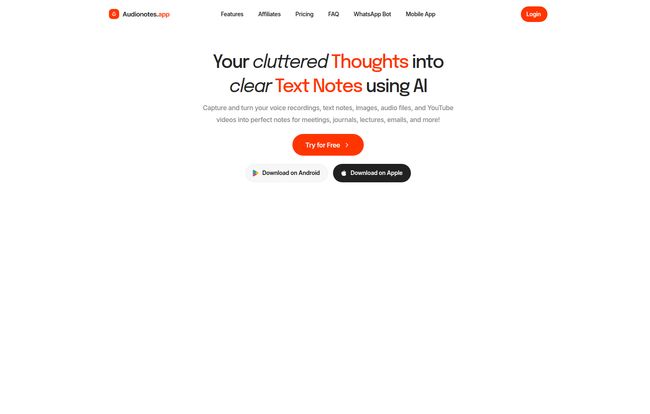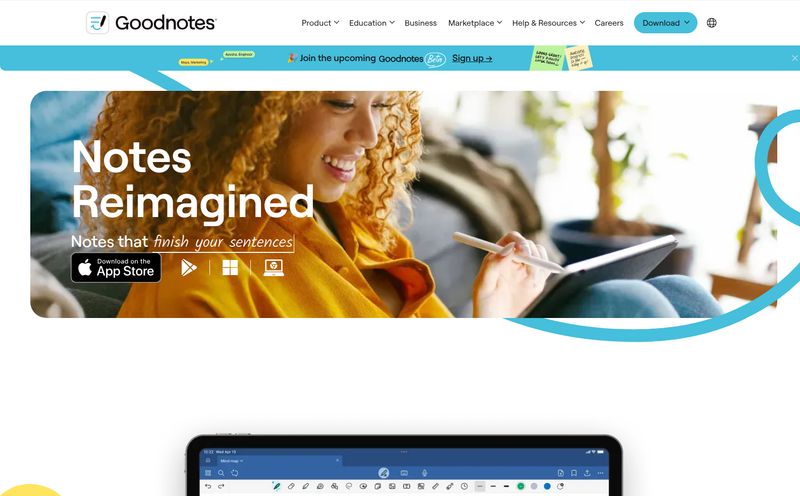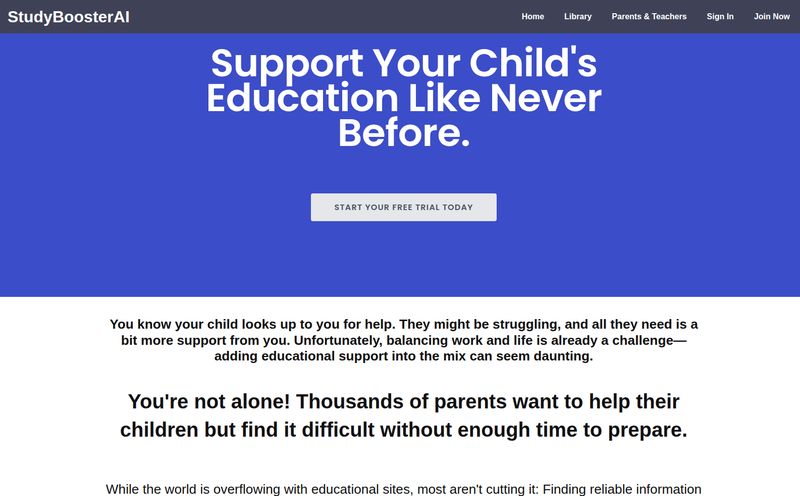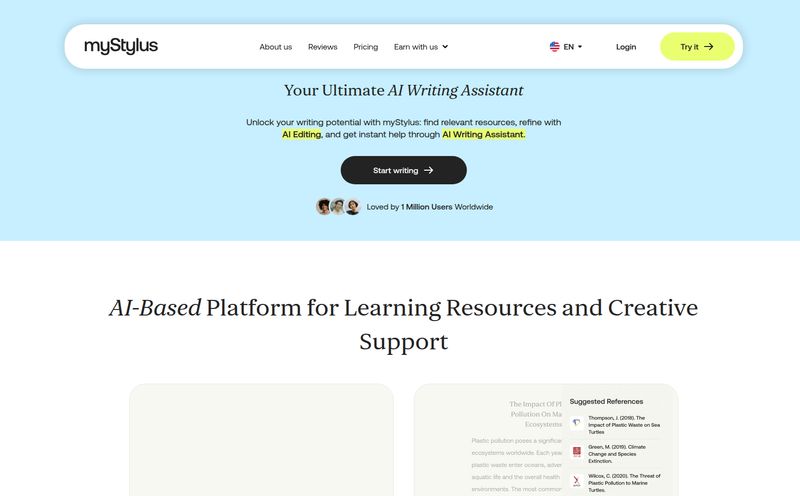If you’re anything like me, your brain is a beautiful, chaotic mess. Mine is a constant whirlwind of blog post ideas, client feedback, random shower thoughts, and snippets of things I need to remember for that meeting tomorrow. For years, my system for capturing this chaos has been, well, not a system at all. It's a jumble of voice memos on my phone, half-written notes in a dozen different apps, and a few cryptic lines scribbled on a sticky note that now makes zero sense.
It’s the great idea graveyard. A place where inspiration goes to die.
So, when I kept hearing whispers about an AI note taking tool called Audionotes, my ears perked up. Another productivity app? Groundbreaking. But this one promised something different. It claimed to be a voice-first assistant that could listen to my unstructured ramblings and magically turn them into organized, useful text. As someone who lives and breathes content and SEO, the idea of turning spoken words into structured summaries, meeting minutes, or even draft articles without the grunt work… that got my attention. I decided to take it for a spin, and honestly, I have some thoughts.
What Exactly is Audionotes? (And Why Should You Care?)
Think of Audionotes less as a simple transcription service and more as a personal archivist or a junior assistant. You dump the raw data in, and it does the hard work of making sense of it. And by raw data, I mean pretty much anything. A frantic voice note you recorded while stuck in traffic? A text file of your brainstorming session? An hour-long YouTube video of a marketing conference you don't have time to watch? Even a picture of a whiteboard covered in notes. You can throw it all at Audionotes.
It then uses AI to not just transcribe the words, but to understand them. It pulls out key themes, creates summaries, identifies action items, and formats everything into clean, structured notes. Suddenly, your chaotic brain dump becomes a coherent document. It’s like having someone who can listen to you think out loud adn then hand you a perfect set of cliff notes.

Visit Audionotes
This isn't just about saving time on typing. It's about closing the gap between having an idea and acting on it. For me, that's the whole ballgame.
Putting Audionotes to the Test: My Real-World Experience
I don't believe in hypotheticals, so I threw my actual, messy work life at Audionotes for a week. I wanted to see if it would crack under the pressure.
From Messy Voice Memos to Actionable Summaries
My first test was my classic 'walking the dog' brainstorming session. I recorded a 10-minute voice note, rambling about a new content strategy for a client. I talked about keyword clusters, pillar pages, CPC trends, and probably the squirrel that ran past. It was a mess. I uploaded the file, selected a 'summary' prompt, and waited.
A minute later, I had a neatly formatted summary with bullet points highlighting the main strategic pillars I’d mentioned. It had filtered out the squirrel and the ums and ahs, presenting me with a document that looked like I’d actually sat down and planned it. I was genuinely impressed.
Taming the Meeting Monster
Next up: the dreaded client call. We've all been there—trying to actively listen, contribute, and take detailed notes simultaneously. It's impossible. This time, I hit record (with everyone's permission, of course) and let Audionotes listen in. After the call, instead of spending 30 minutes deciphering my own handwriting, I had AI-generated meeting minutes. It identified different speakers (mostly), pulled out the decisions made, and listed the action items. A few minor tweaks were needed, but it saved me a solid chunk of administrative time I'd rather spend on, you know, actual SEO work.
The YouTube Video Shortcut
This one felt like a cheat code. There was a 45-minute webinar from a top marketer I wanted to watch, but finding the time was tough. I pasted the YouTube link into Audionotes, and a few minutes later, I had a comprehensive summary of the entire presentation. I got 90% of the value in 5% of the time. This feature alone is a massive productivity hack for anyone who needs to stay on top of industry trends.
The Features That Genuinely Stand Out
A lot of tools have cool features on paper, but only a few really change how you work. For Audionotes, these were the ones that made a difference for me.
- The AI Summarization Quality: It's one thing to get a word-for-word transcript; it's another to get a summary that understands context. The AI here is surprisingly good at figuring out what's important. It's not perfect, but it's a massive head start for creating any kind of content.
- Chat with Your Notes: This is the killer feature. After you've uploaded a bunch of notes, you can literally have a conversation with your own knowledge base. I found myself asking it things like, "What were the main concerns raised in the Q4 client call?" or "Summarize my ideas about the new landing page." It searches through your content and gives you a direct answer. It's like having a personal search engine for your own brain.
- The Integrations (Notion, Zapier, WhatsApp): A tool is only as good as its ability to fit into your existing workflow. The fact that I can automatically send my cleaned-up notes to my Notion database is huge. The WhatsApp bot is also clever—you can just forward a voice note to the Audionotes bot and it processes it for you. It's brilliant for capturing ideas on the fly without even opening an app.
Let’s Talk Money: Audionotes Pricing
Alright, the all-important question: what's this going to cost? Audionotes has a pretty straightforward pricing model. It's not a free tool, and it's positioned for people who see tangible value in the time it saves.
| Plan | Price | Who It's For |
|---|---|---|
| Personal | $69.99 / year | Students, solopreneurs, writers, and anyone looking to organize their personal thoughts and smaller projects. |
| Pro | $129.99 / year | Professionals, marketers, lawyers, entrepreneurs, and power users who deal with frequent meetings and larger volumes of information. |
My take? If you bill by the hour or your time is highly valuable, the cost is a no-brainer. The Personal plan is pretty generous for most individual use cases. If you save even 2-3 hours a month on administrative tasks, the subscription pays for itself. The Pro plan is for those who live in meetings or are using it as a core part of their content creation workflow.
The Not-So-Perfect Parts (The Audionotes Caveats)
No tool is perfect, and it would be dishonest to pretend Audionotes is. There are a few things you absolutely need to know before you jump in.
The biggest one for me is right there in the fine print: it periodically deletes recordings and files. Now, before you panic, this is likely a data storage and privacy measure. They aren't trying to be a permanent cloud storage solution like Dropbox. But it means you CANNOT treat Audionotes as a long-term archive. It’s a processing tool, not a vault.
My advice: Use the integrations. Set up a Zapier or Notion connection to automatically save your finalized, structured notes to your own permanent storage. Think of Audionotes as the brilliant but forgetful assistant; you give it a task, it gives you a perfect report, and then you file that report away yourself. Once you understand that workflow, it's not a dealbreaker, but it's a crucial thing to be aware of.
The other point is simply the price. For a student or someone just starting out, $70 might feel like a lot. There are free transcription tools out there, but they don't offer the summarization and AI features that make Audionotes special. You're paying for the 'synthesis' part, not just the transcription.
Who is Audionotes Actually For?
After a week of heavy use, I have a pretty clear picture of who gets the most out of this tool.
- Students: Recording lectures and getting instant, summarized notes? It's an academic game-changer.
- Marketers and Content Creators: For brainstorming, summarizing research, and turning interviews or webinars into draft content. A huge time-saver.
- Entrepreneurs and Executives: Capturing meeting outcomes, dictating ideas on the go, and keeping a searchable log of decisions.
- Lawyers and Doctors: For dictating case notes or patient interactions and getting clean text back instantly.
- Anyone with ADHD: I saw this mentioned as a use case on their site, and it makes perfect sense. For brains that move a mile a minute, having a tool that can capture the stream of consciousness and organize it later is incredibly powerful.
So, Is Audionotes My New AI Sidekick?
Yeah, I think it is. It's earned its place in my digital toolkit. It's not a magic wand that does all my work for me, but it's a powerful force multiplier. It takes care of the most tedious, brain-numbing part of my workflow: turning chaotic, unstructured information into clean, usable material.
It has its quirks—namely, that file deletion policy—but once you understand its role as a processor rather than a permanent archive, it's an incredibly effective tool. It has successfully decluttered a corner of my brain, and for that alone, it's worth the price of admission. It bridges the gap between thought and text, and in my line of work, that's just about everything.
Your Audionotes Questions Answered
How does Audionotes handle different languages?
It supports over 30 languages. You can record or upload content in languages like Spanish, French, German, and many others, and it will transcribe and summarize them effectively.
Can it transcribe multiple speakers accurately?
In my experience, it does a decent job of identifying that there are different speakers, but it doesn't always label them perfectly (like Speaker A, Speaker B). For generating meeting minutes where you just need the content, it's great. If you need a perfect, court-ready transcript with speaker labels, you might still need a specialized service.
What’s the real story with file deletion?
As mentioned, Audionotes is not permanent storage. It processes your files and then, after a period, clears them to manage storage and protect privacy. The best practice is to always save your finalized notes to another platform like Notion, Google Drive, or your local machine using their integrations.
Is there a free trial to test it out?
Yes, the website has a "Try now for free" option, so you can test out the core functionality and see if its style of AI summarization works for you before committing to a paid plan.
How secure is my data with Audionotes?
The company advertises a "Privacy-First" approach. While details on encryption are on their site, the fact that they periodically delete data can be seen as a privacy-enhancing feature itself—they aren't hoarding your information forever. However, as with any cloud service, avoid uploading extremely sensitive information if you have strict compliance needs.



